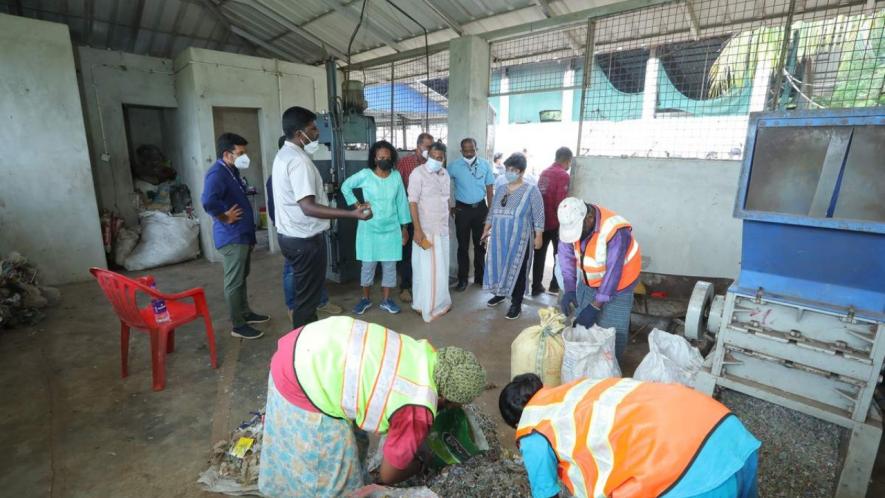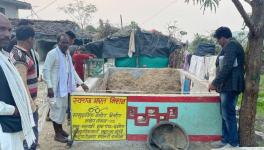Kerala: Decentralised Waste Management Wins Recognition at COP 28, State Aims for ‘Zero Waste’ Status in 2024

Representational image. | Image courtesy: kswmp.org
The COP28, held in Dubai from November 30 to December 12, saw discussion on various issues, including the reduction of fossil fuel usage, amid strong criticism from environmental activists. The conference also discussed different challenges due to rapid urbanisation across the globe, particularly in developing nations.
The waste management problem faced by several cities is considered a reason for climate change, with solid wastes contributing to greenhouse gases. The process of dumping solid waste in landfills has become a methane generation area, while waste combustion centres of nitrous oxide emission.
Decentralised waste management, segregation, and disposal at source are the methods that are much debated. Thiruvananthapuram is one of the cities to successfully implement decentralised waste management, leading to an invitation to the municipal corporation to participate in a discussion on behalf of the Global Alliance for Incinerators Alternative (GAIA).
SUCCESS OF DECENTRALISED WASTE MANAGEMENT
The Thiruvananthapuram Municipal Corporation has been implementing decentralised waste management in all 100 wards with a population of around 9.69 lakhs spread across 214.86 sq km with 2.72 lakh households, 15,000 commercial institutions, 1,200 hotels and restaurants besides 30 markets. The city generates more than 400 tons of waste every day, including 300 tons of organic waste.
The city shifted to decentralisation after the Vilappilsala waste treatment plant was shut down in 2018. The model adopted by the city has won international accolades for being a ’zero waste city’.
Gayathri Babu, the councillor of the corporation and chairperson of the Standing Committee on Health, attended the COP28 to share the city's experience with decentralised waste management.
“I spoke about the experience of Kerala and Thiruvananthapuram, in particular about how decentralised waste management has contributed towards sustainable development, public health and methane reduction,” she told NewsClick.
With increasing challenges of waste management, the COP28 had several discussions during the conference and centralised waste management and treatment plants proved to be disasters.
“We advocated for zero waste cities, with segregation of waste at source. The methods of landfills, Incinerators and waste management plants have proved to be greenhouse emission hotspots, Babu added.
The organic wastes are treated at source, converted to compost, and used for kitchen and rooftop gardens. The corporation carried out a widespread campaign to ensure Green Protocol, Source Segregation, and the ‘Don’t Mix Up’ campaign. It advocated for eco-friendly events for political, religious, and cultural gatherings.
POLICY INTERVENTIONS AND BUDGETARY AIDS HANDY
The Haritha Karma Sena, led by the Self Help Groups (SHGs) of Kudumbashree, the largest women SHGs, plays an important role in waste collection and inorganic waste management. The corporation has designed such workers as ‘Green Technicians’, with their ability to process food, inorganic, meat and vegetable wastes.
While representatives of various organisations in waste management and processing took part in various discussions as part of the COP28 from India, Philippines, Uganda, Brazil, Nigeria, Spain and Chile, Gayathri was the only elected representative from India.
“Some of the cities of the participant countries are implementing small-scale models and community-level actions for decentralised management. But are not as huge and successful as Thiruvananthapuram,” she said.
With Kerala on the west coast receiving frequent and high-intensity rains, the landfills proved to be sources of methane generation during winter and fire accidents in summer. The city administration has learned from the previous mistakes of landfills; with the government of Kerala declaring itself to Be Waste-free in March 2024, such models are gaining woeful importance.
“High humidity during most of the year is conducive for anaerobic digestion of organic waste generation of ammonia and sulphuric gases. The surface level methane generated is dangerous to public health. The legacy waste dumps emit smoke, and this combination is dangerous and a source of severe pollution,” she said.
The Haritha Karma Sena, the collective of women's SHGs, is being credited for its role in waste management. The localised action groups, including ward-level assembly on climate and waste, Children's Assembly and Green Army, and the Youth for Zero Waste and Climate, are playing crucial roles.
“The government and the municipal corporation are providing subsidies for alternate, urban gardening, intolerance towards waste disposal in public places, continuous campaigns and awareness programs. With participatory planning being the strength of local self-governments in Kerala, the missions are accomplished with active contribution from the general public, Babu added.
The policy interventions and budgetary allocations from the LSGs and the government of Kerala are instrumental in achieving the zero waste Target set by the government.
Get the latest reports & analysis with people's perspective on Protests, movements & deep analytical videos, discussions of the current affairs in your Telegram app. Subscribe to NewsClick's Telegram channel & get Real-Time updates on stories, as they get published on our website.
























